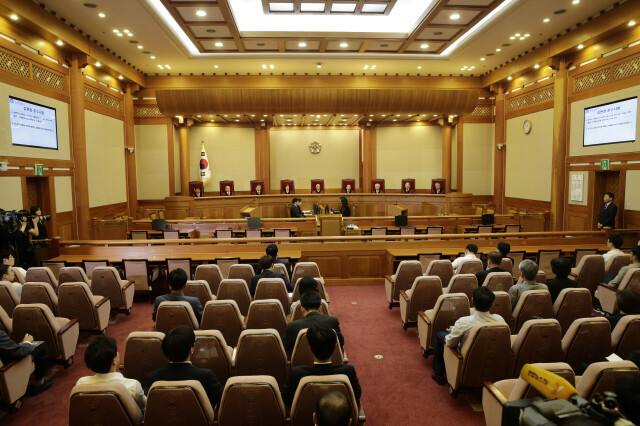hankyoreh
Links to other country sites 다른 나라 사이트 링크
Constitutional Court rejects jurisdiction dispute filed by Saenuri Party lawmakers

The Constitutional Court has declined to consider whether the National Assembly speaker’s refusal to bring bills to a vote because of the National Assembly Advancement Act violated the authority of National Assembly lawmakers.
On May 26, the Constitutional Court announced in the large chamber that it was dismissing a jurisdiction dispute filed by ruling Saenuri Party lawmakers.
By dismissing a lawsuit, a court refuses to hold hearings on a case that it believes does not satisfy the basic legal requirements.
In Jan. 2015, Joo Ho-young and 18 other lawmakers from the Saenuri Party asked the Constitutional Court to settle a jurisdiction dispute with the speaker of the National Assembly. The plaintiffs wanted the court to invalidate the speaker’s declaration on May 2012 that the National Assembly Advancement Act had passed, arguing that the act infringes on lawmakers’ rights to debate and to vote on legislation.
The plaintiffs asked the court to examine the speaker’s refusal to set periods of debate for 11 bills (including the North Korean Human Rights Act) in Dec. 2014 and 10 bills (including the Service Sector Development Act) in Jan. 2016.
Article 85 of the National Assembly Act (which was revised in the National Assembly Advancement Act) placed restrictions on the speaker’s ability to bring a bill to the floor for a vote.
According to the revision, the speaker can only fast-track a bill when it has the support of 60% of the lawmakers in the subcommittee in charge of the bill or in the plenary session. Furthermore, the speaker’s privilege is restricted to bills written to address a national emergency (such as a natural disaster or a war), and the speaker must gain the approval of the ranking lawmaker in each of the parliamentary groups to ensure bipartisan agreement.
Before the National Assembly Act was revised, bills were passed through quorum decisions. Bills needed the support of a majority of lawmakers in attendance (provided that a majority of total lawmakers were present).
The plaintiffs had contended that the National Assembly Advancement Act ran contrary to the principle of majority voting outlined in South Korea’s constitution. Their evidence was that the clause in the act that requires a three-fifths majority of lawmakers in the subcommittee or the plenary session conflicts with Article 49 of the constitution, which states that “except as otherwise provided for in the Constitution or in Act, the attendance of a majority of the total members, and the concurrent vote of a majority of the members present, shall be necessary for decisions of the National Assembly.”
But the defendants countered that “the principle of majority voting implies a qualitative majority that pays heed to the opinions of the minority. As such, decisions that are made by a majority vote to the omission of the process of debate and persuasion represent the tyranny of the majority.”
A jurisdiction dispute appeal involves asking the court to determine whether an action or omission by one government agency infringes upon the authority of another government agency.
The Saenuri Party lawmakers who were the plaintiffs in the case had hoped that the court would render a verdict on the constitutionality of the act, but this did not happen.
Even if the Constitutional Court had accepted the plaintiffs’ argument that the National Assembly speaker had infringed on their rights, the article in the National Assembly Advancement Act would not have been immediately invalidated.
By Kim Ji-hoon, staff reporter
Please direct questions or comments to [english@hani.co.kr]

Editorial・opinion
![[Column] Season 2 of special prosecutor probe may be coming to Korea soon [Column] Season 2 of special prosecutor probe may be coming to Korea soon](https://flexible.img.hani.co.kr/flexible/normal/500/300/imgdb/original/2024/0426/3317141030699447.jpg) [Column] Season 2 of special prosecutor probe may be coming to Korea soon
[Column] Season 2 of special prosecutor probe may be coming to Korea soon![[Column] Park Geun-hye déjà vu in Yoon Suk-yeol [Column] Park Geun-hye déjà vu in Yoon Suk-yeol](https://flexible.img.hani.co.kr/flexible/normal/500/300/imgdb/original/2024/0424/651713945113788.jpg) [Column] Park Geun-hye déjà vu in Yoon Suk-yeol
[Column] Park Geun-hye déjà vu in Yoon Suk-yeol- [Editorial] New weight of N. Korea’s nuclear threats makes dialogue all the more urgent
- [Guest essay] The real reason Korea’s new right wants to dub Rhee a founding father
- [Column] ‘Choson’: Is it time we start referring to N. Korea in its own terms?
- [Editorial] Japan’s rewriting of history with Korea has gone too far
- [Column] The president’s questionable capacity for dialogue
- [Column] Are chaebol firms just pizza pies for families to divvy up as they please?
- [Column] Has Korea, too, crossed the Rubicon on China?
- [Correspondent’s column] In Japan’s alliance with US, echoes of its past alliances with UK
Most viewed articles
- 1Samsung subcontractor worker commits suicide from work stress
- 2‘We must say no’: Seoul defense chief on Korean, USFK involvement in hypothetical Taiwan crisis
- 3[Editorial] Korea’s surprise Q1 growth requires objective assessment, not blind fanfare
- 4Division commander ordered troops to enter raging flood waters before Marine died, survivor says
- 5Is Japan about to snatch control of Line messenger from Korea’s Naver?
- 6No good, very bad game for Korea puts it out of Olympics for first time since 1988
- 7US overtakes China as Korea’s top export market, prompting trade sanction jitters
- 8N. Korean delegation’s trip to Iran shows how Pyongyang is leveraging ties with Moscow
- 9Korea’s 1.3% growth in Q1 signals ‘textbook’ return to growth, says government
- 10[Column] Season 2 of special prosecutor probe may be coming to Korea soon